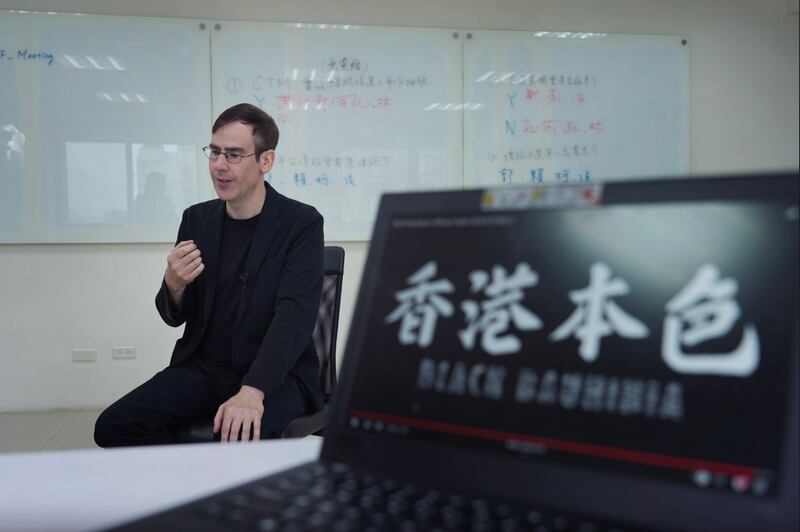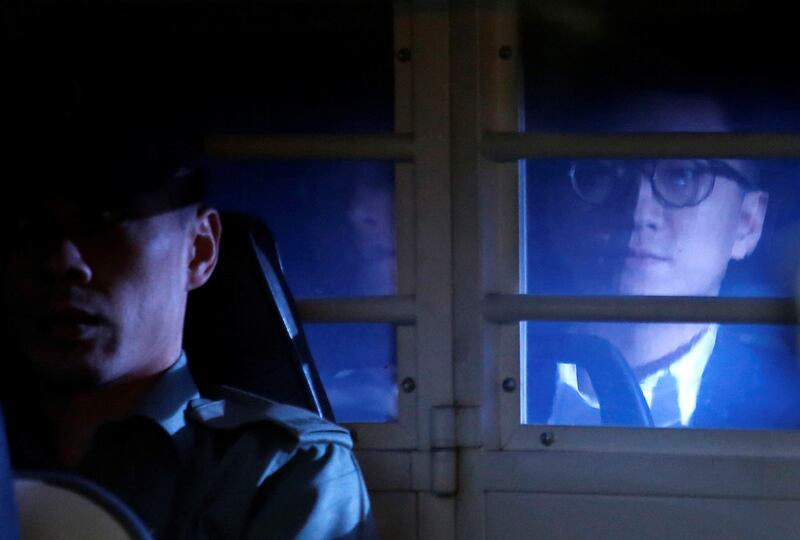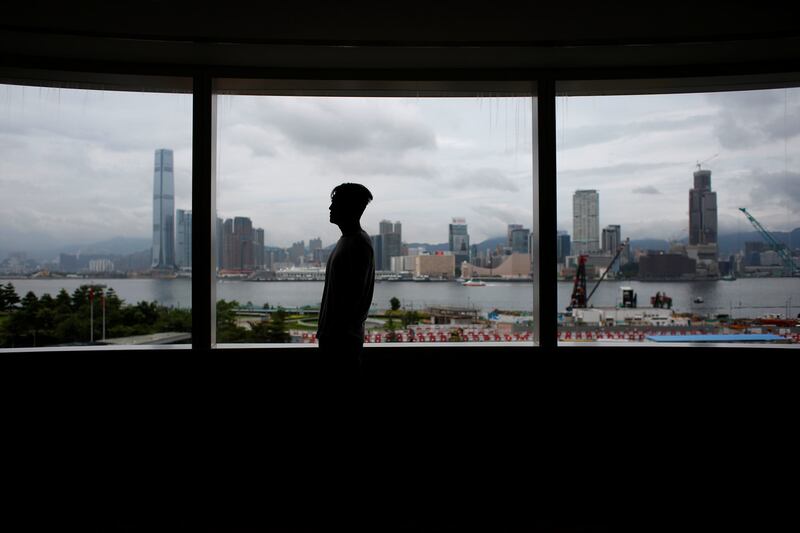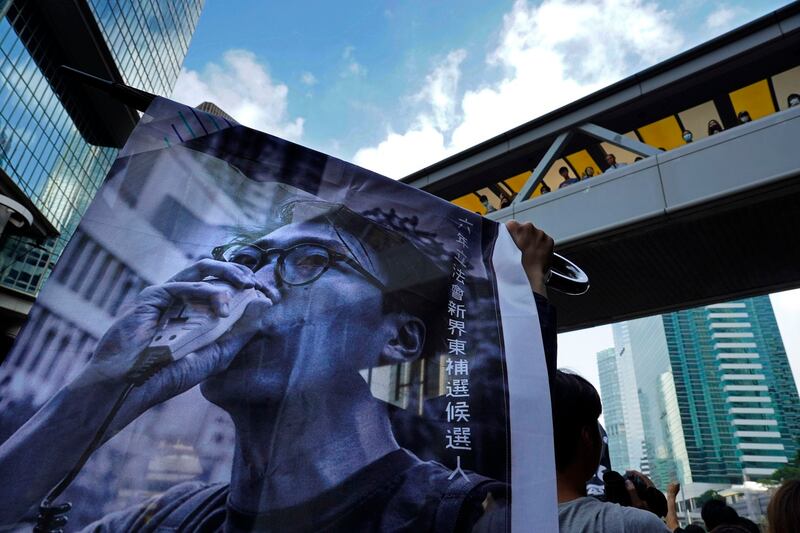A new documentary about the outlawed Hong Kong independence movement could influence the citizens of democratic Taiwan ahead of the presidential poll in January 2024, as it highlights the erosion of freedoms promised by Beijing, according to its director.
Malte Kaeding, whose documentary "Black Bauhinia" will screen in Taiwan at the weekend, said the rolling back of Hong Kong's promised freedoms that sparked the protests, and the subsequent crackdown on dissent under a draconian security law have given many in Taiwan a sense of what might happen if they went along with China's calls for "unification."
Hong Kong was promised the continuation of its freedoms of speech, press and association for at least 50 years after the 1997 handover to Chinese rule.
But rather than moving towards fully democratic elections as stipulated in the city's Basic Law, the ruling Chinese Communist Party has clamped down on political opposition well ahead of that date, while claiming that the "one country, two systems" framework it promised is still working well.

"Black Bauhinia" follows two young Hong Kong activists as they are forced to decide between long-term imprisonment and refugee camps for a life in exile following mass protests in their home city.
Unlike earlier 2019 protest documentaries, the film focuses exclusively on Hong Kong localism and the independence movement, following independence activist Edward Leung, who coined the banned protest slogan " Free Hong Kong, Revolution Now!" and fellow independence activist Ray Wong, who was granted political asylum by Germany in 2018, angering Beijing.
"Throughout Black Bauhinia’s three-year production period, localism inspired the 2019 Hong Kong protests, while the ensuing government crackdown rendered the documentary into an outlawed element of resistance," the film's website says.
"Black Bauhinia captures the ideas of a young generation that dared to challenge an authoritarian China."
Cautionary tale for Taiwan
Kaeding hopes that the film will serve as a cautionary tale for Taiwanese audiences as they consider whom to vote for in the ongoing presidential race.
"Hong Kong has influenced Taiwanese people's view of China, so, as you know, the idea was always from the Chinese side, that ' one country, two systems' will be available to Taiwan -- it will be the best way of 'solving' [what they call] the 'Taiwan question," Kaeding told RFA Cantonese.
The majority of Taiwan's 23 million people don't identify as Chinese, and have no wish to be ruled by the Chinese Communist Party or to give up their democratic way of life, according to recent opinion polls and election results, despite Beijing's territorial claim on the island.

"Every Taiwanese looking at Hong Kong now realizes that these promises made under 'one country, two systems' by the Chinese government are not really something that can be trusted in. These promises are not being kept," Kaeding said.
"So that influences their view of the relationship with China, definitely," said Kaeding, who finished the film on his last trip to Hong Kong in January 2020, just before the National Security Law criminalized any talk of independence, or "secession."
"I haven't tried to get into Hong Kong [since]," he said. "I think it's better to stay away ... I think it might be too sensitive for me to go to Hong Kong for the time being."
'Hostile foreign forces'
Kaeding, who is a senior lecturer in international politics at the University of Surrey, has also cut off all contact with Leung, for fear of endangering him now that he has been released from prison into an ever-widening crackdown on political opposition and public dissent.
"I purposely cut all contact with him because I think it's too dangerous," he said. "Once he went into prison, I stopped contacting him or his family because as you know the [accusations of] so-called ' foreign forces,' 'foreign interference' would just hurt him or his family, so I think it's not wise to engage."

The Chinese and Hong Kong governments have blamed recent waves of mass protest in Hong Kong on incitement by “hostile foreign forces” seeking to foment a “color revolution” in the city.
In August, security chief Chris Tang blamed the mass protest campaign in 2012 by students -- some of them still in secondary school -- against patriotic education in Hong Kong's schools, the 2014 Occupy Central movement for fully democratic elections, the 2016 localist-linked " fishball revolution" in Mong Kok and the 2019 movement against extradition to mainland China on the actions of "foreign forces."
Hong Kong leader John Lee vowed in his annual policy address last month to "eradicate the causes of dissent" in the city, which he said still lingers despite a years-long crackdown, adding that his administration is currently drafting new national security legislation to be passed in 2024.
Dramatic changes
Academic freedom has also suffered since 2019, with university students forced to pass classes in "national security education" in order to graduate, and Tiananmen massacre historian Rowena He recently denied a work visa following criticism in the pro-Beijing press.
"One of the concerns ... is of course academic freedom in Hong Kong, and problem is that for subjects such as political science, sociology, international relations, the social sciences, but also even history or social work and others, there are a lot of issues where the Hong Kong government or the Chinese government is drawing up so-called red lines, but these red lines are changing all the time," Kaeding said.
"So it becomes very uncertain, what you can research, what is acceptable to research," he said, adding that uncertainty around visas could act as a deterrent to international scholars visiting the city.
"There is a level of unpredictability now with any academic events in Hong Kong, which makes academic exchanges with colleagues in Hong Kong very very difficult," he said. "People may just think ... why would I go to Hong Kong if maybe at the last minute my visa is canceled, or maybe I'm disinvited."

Yet Kaeding still sees Hong Kong as a topic of urgent international interest, several years into Beijing's crackdown on its promised freedoms.
"I think people still care about Hong Kong because the changes in Hong Kong have been so dramatic, and I think that's really something the international audience hasn't seen in that way, that a liberal free society has been put under pressure and unraveled in a very short period of time," he said.
"It's very sad ... but I'm not a Hong Konger; I haven't lost my home. I think for Hong Kongers, it's a much much sadder and more desperate situation."
Translated by Luisetta Mudie .
